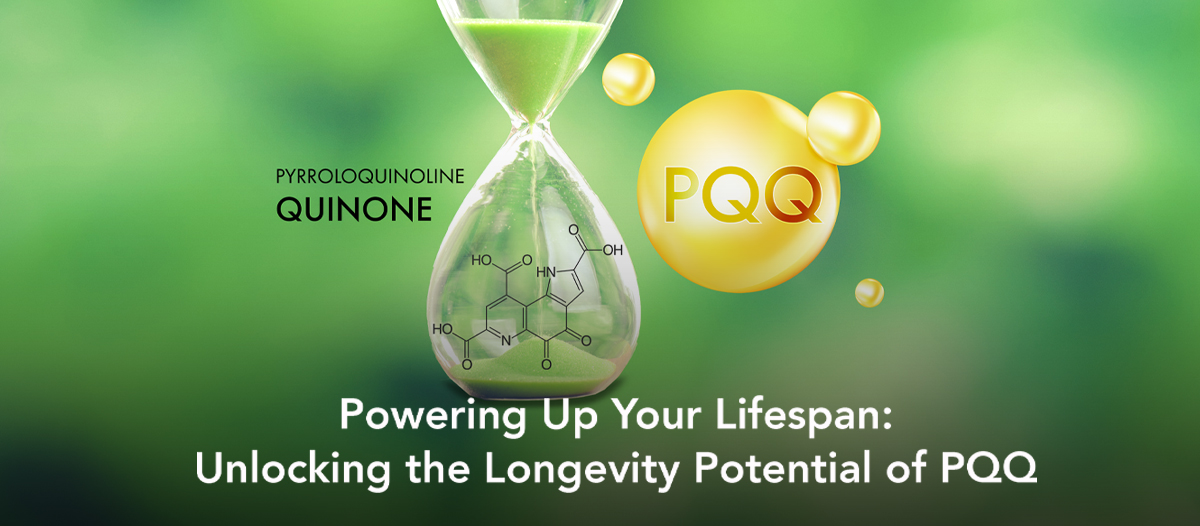Powering Up Your Lifespan: Unlocking the Longevity Potential of PQQ
by Mark J Kaylor
In our pursuit of radiant health and a vibrant, long life, understanding the powerhouses within our cells – the mitochondria – is paramount. These tiny organelles are responsible for generating the energy that fuels every process in our body. As we age, mitochondrial function naturally declines, contributing to many age-related issues. This has sparked intense interest in compounds that can support and even boost mitochondrial health, with Pyrroloquinoline quinone (PQQ) emerging as a fascinating contender. But is PQQ the key to unlocking exceptional longevity, or is the reality more nuanced? Let’s delve into the science.
The Promise of PQQ: A Look at the Evidence
The buzz around PQQ stems from compelling research suggesting its potential to influence mitochondrial biogenesis – the creation of new mitochondria. This is a crucial process for maintaining cellular energy and vitality as we age.
- Cellular and Animal Insights: Early studies, such as the groundbreaking 2003 research in the Journal of Biological Chemistry, revealed that PQQ could stimulate the expression of PGC-1α, a master regulator of mitochondrial biogenesis, in cell cultures and animal models. This sparked considerable excitement about its potential to rejuvenate cellular energy production. Further research, including a 2013 study in Food Style, indicated that PQQ supplementation could enhance mitochondrial efficiency and combat inflammation in rodents, both critical factors in aging. Some studies even demonstrated increased production of ATP, the fundamental unit of cellular energy, in animals supplemented with PQQ. This aligns with your past interest in cellular energy and related supplements like Acetyl L-Carnitine and Alpha Lipoic Acid.
- Early Hints in Human Studies: While large-scale human trials remain limited, initial studies offer intriguing glimpses. A 2013 publication in Functional Foods in Health and Disease reported improvements in cognitive function and reduced fatigue in adults taking PQQ. This resonates with your searches related to cognitive health and supplements like Lion’s Mane and Ginkgo Biloba. Another 2016 human study noted self-reported benefits in sleep, mood, and energy levels with PQQ supplementation. Given your interest in sleep and overall well-being, these findings are noteworthy, though the self-reported nature highlights the need for more objective measures.
Navigating the Caveats: Understanding the Research Landscape
Despite the encouraging preliminary findings, it’s crucial to approach the longevity claims surrounding PQQ with a discerning eye, as the research landscape presents some challenges:
- The Need for Robust Human Trials: The most significant gap is the scarcity of extensive human studies specifically designed to confirm PQQ’s ability to stimulate mitochondrial biogenesis under real-world conditions. While animal studies provide a foundation, human physiology is complex, and results don’t always translate directly.
- Considering Commercial Influence: A considerable portion of the research on PQQ has been funded by the supplement industry. While not inherently invalid, this raises the possibility of bias and necessitates careful evaluation of the findings.
- Long-Term Effects Remain a Mystery: The majority of existing studies on PQQ are short-term, often spanning just a few weeks. This makes it challenging to determine the long-term impact of PQQ on human mitochondrial function, overall health, and ultimately, longevity. As someone interested in long-term health strategies, this limitation is important to acknowledge.
- Marketing Exaggerations: The supplement market often amplifies the benefits of compounds like PQQ, sometimes presenting animal research as definitive proof of human efficacy. It’s essential to separate marketing hype from the actual scientific evidence.
PQQ and the Longevity Equation: Beyond Biogenesis
While the direct human evidence for PQQ’s role in stimulating mitochondrial biogenesis may be limited, it doesn’t negate its potential value in supporting mitochondrial health and, consequently, contributing to a longer, healthier life. PQQ may exert its positive effects through other crucial pathways:
- Mitochondrial Defense Against Oxidative Stress: PQQ acts as a potent antioxidant, helping to neutralize harmful free radicals within the mitochondria. Given your interest in antioxidants like hesperetin and astaxanthin, this protective mechanism aligns with your pursuit of cellular defense against age-related damage.
- Supporting Cellular Energy Production: Even without directly increasing the number of mitochondria, PQQ may enhance the efficiency of existing ones, leading to improved energy levels. This resonates with your research into supplements for cellular energy.
- Potential Cognitive and Metabolic Benefits: The initial human studies suggesting improvements in cognitive function and potentially metabolic efficiency are promising avenues for further exploration regarding PQQ’s role in healthy aging. Your interest in cognitive enhancement and metabolic health makes these potential benefits particularly relevant.
It’s important to note that while PQQ shows promise, its effects on stimulating mitochondrial biogenesis in humans are not as firmly established as other well-researched strategies like exercise (which you have searched for in relation to slowing aging), intermittent fasting (another area of your interest), cold exposure, Urolithin A (derived from pomegranates, which you’ve explored for potential Alzheimer’s protection), and NAD+ precursors.
Practical Considerations: Dosage, Safety, and Interactions
If you’re considering adding PQQ to your radiant health regimen, understanding the practical aspects is key:
- Typical Dosage: Human studies generally use a daily dose of around 20 mg, though supplements often range from 5 mg to 20 mg. Some formulations combine PQQ with Coenzyme Q10 (CoQ10), reflecting a potential synergistic effect on mitochondrial function.
- Safety Profile: PQQ is generally considered safe at moderate doses. However, animal studies have indicated potential oxidative damage at very high doses (above 40 mg per day).
- Possible Side Effects: Mild side effects such as headaches, gastrointestinal discomfort, and insomnia have been reported in some individuals. In rare cases, allergic reactions may occur.
- Potential Interactions: Research on PQQ’s interactions with other substances is still limited, but caution is advised:
- Blood Pressure Medications: PQQ’s potential mild blood pressure-lowering effect could interact with antihypertensive drugs.
- Antioxidant Supplements (High Doses): As you’ve researched, PQQ has a unique redox cycling mechanism. Combining it with very high doses of other potent antioxidants like vitamin C or NAC could potentially interfere with its signaling and even blunt beneficial oxidative stress signals needed for mitochondrial adaptation.
- Mitochondrial-Affecting Medications: If you are taking medications like certain statins or metformin that influence mitochondrial function, it’s wise to consult your healthcare provider about potential interactions with PQQ.
The Radiant Health Perspective: A Holistic Approach to Longevity
Ultimately, while PQQ holds intriguing potential as a mitochondrial protector and supporter of overall cellular health, it’s crucial to view it within the broader context of a radiant health journey focused on longevity.
- Who Might Find PQQ Beneficial? Individuals seeking general support for mitochondrial and cognitive function may find PQQ a worthwhile addition to their regimen.
- Manage Your Expectations: It’s essential to be realistic and avoid expecting PQQ to be a standalone miracle cure for extending lifespan or dramatically enhancing performance.
Prioritizing Proven Longevity Strategies:
For those whose primary goal is to stimulate mitochondrial biogenesis and maximize longevity, the current body of evidence strongly supports prioritizing these strategies:
- Consistent Exercise: Engage in both high-intensity and endurance training, as you’ve explored, to significantly boost mitochondrial activity.
- Strategic Dietary Practices: Incorporate intermittent fasting and explore the benefits of caloric restriction, aligning with your past research in these areas.
- Embrace Cold Therapy: Consider practices like cryotherapy or cold showers to trigger positive metabolic adaptations.
- Leverage Well-Researched Compounds: Explore the potential of Urolithin A and NAD+ precursors like NMN or NR, which have more robust human data supporting their role in mitochondrial health and longevity.
The Takeaway for a Longer, Healthier Life:
PQQ presents an interesting avenue for supporting mitochondrial health, potentially acting as a valuable protector of these cellular powerhouses. However, it’s not currently positioned as a primary driver of mitochondrial biogenesis in humans based on the available evidence. Embrace a holistic approach to radiant health, prioritizing well-established lifestyle and nutritional strategies for longevity, and view PQQ as a potentially supportive element in your comprehensive plan.
Looking Ahead: Future research, particularly well-designed, independent, and large-scale human studies, will be crucial in definitively determining the true impact of PQQ on mitochondrial function and its role in promoting a longer and healthier lifespan.

Mark J. Kaylor is a passionate advocate for holistic health and natural remedies, with a focus on extending both lifespan and healthspan. As the founder of the Radiant Health Project and host of the Live Longer Podcast, Mark blends in-depth research with traditional wisdom to empower others on their journey to vibrant health. Through his writing and speaking, he shares insights into the transformative power of herbs, nutrition, and lifestyle practices.
Disclaimer: All information and results stated here is for educational and entertainment purposes only. The information mentioned here is not specific medical advice for any individual and is not intended to be used for self-diagnosis or treatment. This content should not substitute medical advice from a health professional. Always consult your health practitioner regarding any health or medical conditions.



Leave A Comment